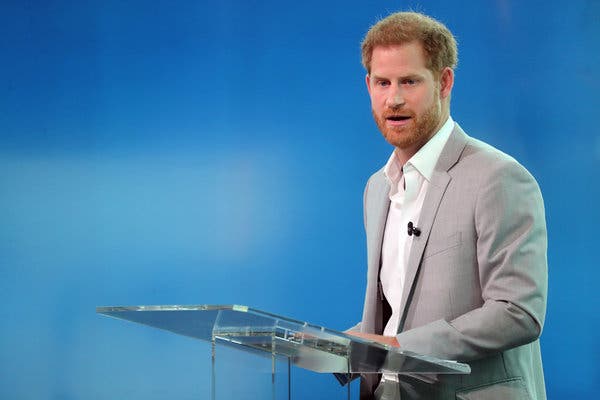
Prince Harry, the Duke of Sussex, will lead a global sustainable travel initiative to bring companies, consumers and communities together, he announced on Tuesday in Amsterdam.
The initiative, called Travalyst, has been in the works for three years, Kensington Palace said. The duke began engaging in conversations with the travel industry in 2017, and the first official partnership meeting took place in January with a group of travel companies including Booking.com, Ctrip, Skyscanner, TripAdvisor and Visa, in hopes of making the tourism industry more environmentally responsible.
“Our world faces environmental challenges of unprecedented scope and scale,” the duke said on Tuesday. “From deforestation and the loss of biodiversity, to ocean plastics and poaching, the problems can sometimes seem too big to fix. These human-caused challenges often need a giant system shift to make a significant enough impact.”
Travalyst comes at a time when airlines and cruise companies, along with restaurant and hotel companies, are grappling with how to make the travel industry less damaging to the environment. It also comes weeks after the duke and his wife, Meghan, the Duchess of Sussex, came under fire for traveling on private jets, which have a greater relative carbon impact than commercial planes. The duke flew commercial to Amsterdam.
The consortium aims to educate people about sustainable travel, overtourism and make it easier for them to understand whether their own travels are helping or hurting the planet and who is benefiting from travel dollars.
“We want to make sustainability a priority across the entire travel experience,” said Gillian Tans, Booking.com’s chairwoman. “Another goal is how to minimize the environmental footprint of travel, and the other goal is to protect and preserve local environments, welfare and cultural heritage and help to improve the welfare of local people for the longer term.”
Increasingly, people expect travel companies to offer more sustainable options and want the money they spend on tourism to go back into the local communities they visit, and that’s where Travalyst will come in, the duke said.
“Sometimes when we appreciate the world’s beauty, we heighten its fragility,” he said. “It’s a paradox. But in our enthusiasm we can put great strain on the natural wonders we travel to see as well as the communities that call these places home.”
A number of travel companies have recently launched sustainability initiatives, including the hotel companies IHG and Marriott, both of which said they would ban small plastic bottles of bath and skin products. KLM, the Dutch airline, has run ads asking consumers to rethink their travel plans and perhaps skip a plane trip.
But this will be the first time a member of the British royal family has been involved. The duke previously has publicly supported mental health awareness, founded a charity to help children living with H.I.V. /AIDS and has spoken about environmental conservation projects across Africa.
“If you think about the duke,” Ms. Tans said, “for all his life he has been supporting conservation projects, and also he has traveled so much and has seen the connection between environmental damage, community struggles and tourism.”
She added that the duke’s passion for sustainable travel has been evident throughout the planning and organization of Travalyst.
On Saturday, the duke and duchess announced on Instagram that in the next few weeks they would be traveling to South Africa as a family and that the duke would visit Malawi, Botswana and Angola. In the post, the couple also called attention to 22 organizations, most of them local groups that work in conservation and local empowerment in countries including Namibia, South Africa, Zimbabwe and Kenya.
In the debate over whether travel is a net good or bad for the planet, the duke appears to come down on the side of good.
“If conducted responsibly, tourism can benefit communities for generations,” the duke said.
The United Nations World Tourism Organization said that in 2018, 1.4 billion people traveled internationally, and it estimates that 1.8 billion international trips will be taken annually by 2030. Since 2000, the number of trips taken annually by people around the world has more than doubled, according to the World Bank, and there is no sign of these numbers tapering off.
The U.N. estimates that in 10 years, the number of tourists visiting countries in emerging markets will reach 1 billion annually, making up 57 percent of all international trips globally. That is one of the reasons that Travalyst is focusing on the communities affected by travel.
“By harnessing the power of the private sector, Travalyst will complement some of the great work already being done by NGOs, activists, governments, and multilateral organizations across the world,” the duke said.
52 PLACES AND MUCH, MUCH MORE Follow our 52 Places traveler, Sebastian Modak, on Instagram as he travels the world, and discover more Travel coverage by following us on Twitter and Facebook. And sign up for our Travel Dispatch newsletter: Each week you’ll receive tips on traveling smarter, stories on hot destinations and access to photos from all over the world.






